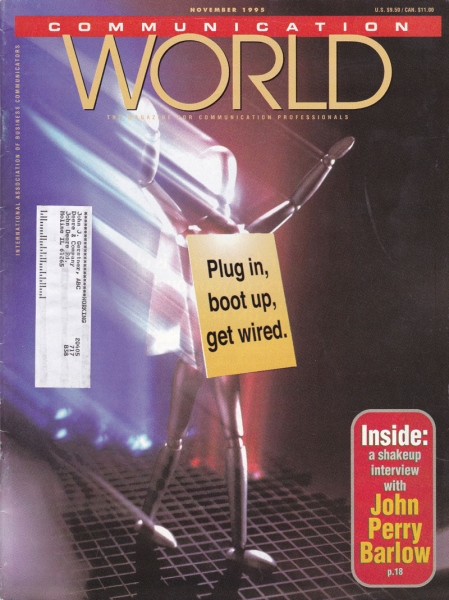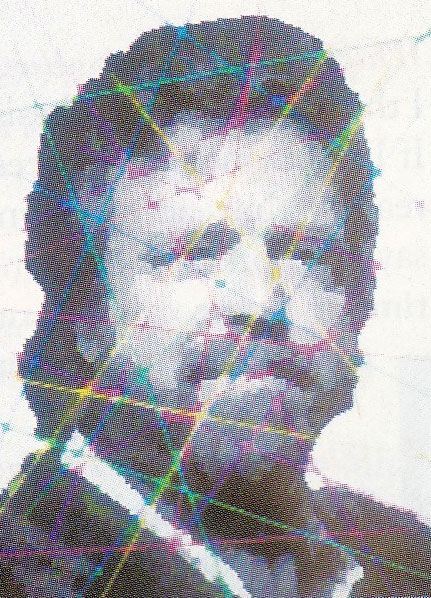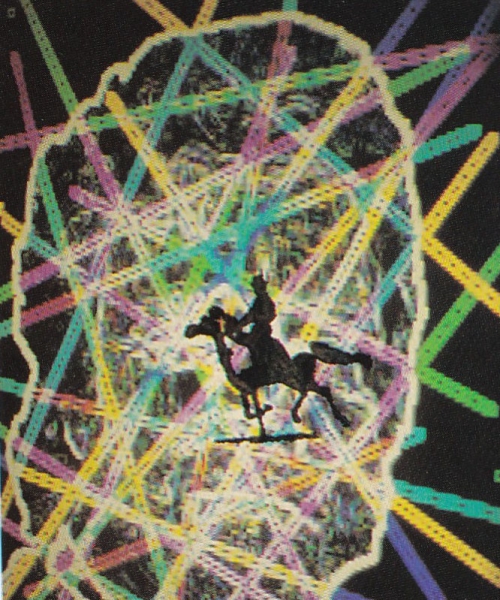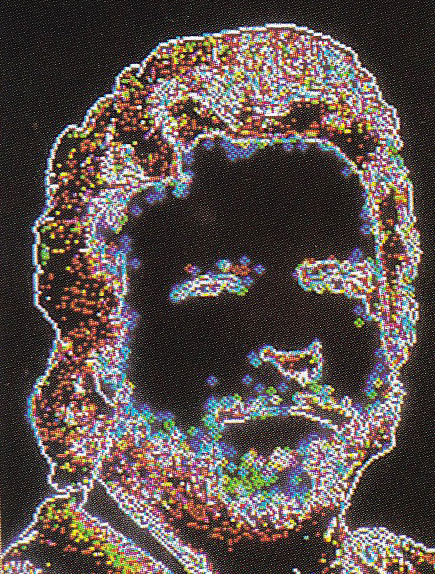 “Imagine discovering a continent so vast that it may have no other side. Imagine a new world with more resources than all our future greed might exhaust, more opportunities than there will ever be entrepreneurs enough to exploit, and a peculiar kind of real estate which expands with development.” John Perry Barlow describing cyberspace in 1981.
“Imagine discovering a continent so vast that it may have no other side. Imagine a new world with more resources than all our future greed might exhaust, more opportunities than there will ever be entrepreneurs enough to exploit, and a peculiar kind of real estate which expands with development.” John Perry Barlow describing cyberspace in 1981.
 This is the first in a series of interviews with internet technology gurus I did for IABC Communication World Magazine in 1995 and 1996. The Civilization of Cyberspace series included interviews with John Perry Barlow, Nicholas Negroponte, Cliff Stoll, Esther Dyson, Manuel Castells and Don Tapscott.
This is the first in a series of interviews with internet technology gurus I did for IABC Communication World Magazine in 1995 and 1996. The Civilization of Cyberspace series included interviews with John Perry Barlow, Nicholas Negroponte, Cliff Stoll, Esther Dyson, Manuel Castells and Don Tapscott.
“Cyberspace. A consensual hallucination experienced daily by billions of legitimate operators, in every nation … A graphic representation of data abstracted from the banks of every computer in the human system. Unthinkable complexity: Lines of light ranged in the nonspace of the mind, clusters and constellations of data. Like city lights, receding…” William Gibson, from Neuromancer
“The Internet is growing like slime mold.” – John Perry Barlow
As if communicators’ so-called lives weren’t already pressurized, a few new tasks are suddenly popping onto our “to do” list. Such as … buy a modem; find an Internet access provider; get intimately familiar with FTP, gopher, HTML and PDF; subscribe to some Usenet newsgroups and learn “Netiquette”; and design and launch a Home Page for your organization. Plug in, boot up, get wired.
Ready or not, this is the reality of cyberspace, an alluring yet threatening frontier that in some ways conjures up an image of the 19th-century American West. While we settlers are still secure on our covered couches, content watching television or America Online, the cybercowboys, cyberpunks, netheads and byte drovers are restlessly staring at a different screen.
With Gold Rush fervor, they are lording over incompatible protocols, braving arcane computer interfaces and leaping past those infernal error messages to forge virtual communities, cultures and consciousness. Just as in the Wild West, the digital pioneers tend to be tribal, idealistic and iconoclastic. They despise anything that resembles rules or laws in their virtual villages, preferring to let Netizens write their own codes as needed, asserting that any law in cyberspace cannot be enforced anyway.
Depending on whom you believe, there may be as many as 30 million “Internauts” now surfing the Net (albeit they may mostly be American males and under the age of 50). This number is said to be doubling about every nine months, and has been since 1968. Many predict at least a 10-fold increase, to 300 million, by the year 2000.
This online explosion means – especially for the communicator – it has truly become a matter of lead, follow or get out of the way. The good news, according to John Perry Barlow – who is surely on the short list of prominent Cybergurus – is that the communicators’ skills of perceiving and explaining reality will be increasingly valued as we advance toward lives increasingly virtual.
The bad news, says Barlow, is that the institutions communicators work for are doomed. “The Net is about taking power away from institutions and giving it to individuals,” Barlow told a large audience at the 1995 IABC International Conference in Toronto. “Great big, centralized, hierarchical companies are just going to keel over and die.”
It was not a universally appreciated message, of course, but Barlow – tall, bearded, and rugged like the cowboy he once was – prides himself on speaking his mind. “I’m incredibly blessed to be one of very few people in society that can say whatever he thinks without fear of being denied a paycheck. I wish for a world where everybody will have as much of that same freedom as they can take.”
 Recently declared by the Utne Reader to be among “100 Visionaries Who Could Change Your Life,” Barlow arrived on the cyberscene in the same roundabout fashion you use when you explore the Web … following whims, hyperlinking from one unrelated site to another. So, after earning an honors degree in comparative religion from Wesleyan University in 1969, Barlow went into cattle ranching in Cora, Wyoming, his hometown. His interest in music and poetry led him to start co-writing songs for the U.S. music group, Grateful Dead. He was one of the first Deadheads to begin using the Internet to stay connected. He eventually became so engrossed with the possibilities of virtual communities and the direction computer information was taking the world, he sold the ranch in 1988 to write about it, and indirectly make the Internet his life. In 1990, he and Mitchell Kapor founded the Electronic Frontier Foundation, an organization that promotes freedom of expression in digital media. He currently serves as its vice chairman.
Recently declared by the Utne Reader to be among “100 Visionaries Who Could Change Your Life,” Barlow arrived on the cyberscene in the same roundabout fashion you use when you explore the Web … following whims, hyperlinking from one unrelated site to another. So, after earning an honors degree in comparative religion from Wesleyan University in 1969, Barlow went into cattle ranching in Cora, Wyoming, his hometown. His interest in music and poetry led him to start co-writing songs for the U.S. music group, Grateful Dead. He was one of the first Deadheads to begin using the Internet to stay connected. He eventually became so engrossed with the possibilities of virtual communities and the direction computer information was taking the world, he sold the ranch in 1988 to write about it, and indirectly make the Internet his life. In 1990, he and Mitchell Kapor founded the Electronic Frontier Foundation, an organization that promotes freedom of expression in digital media. He currently serves as its vice chairman.
Today, Barlow circles the globe lecturing on the “virtualization of society.” He is a recognized commentator on computer security, Virtual Reality, digitized intellectual property, and the social and legal conditions arising in the global network of connected digital devices. He is a contributing editor of numerous publications, including Communications of the ACM, Microtimes, and Mondo 2000. He is also a contributing writer for Wired.
His 1995 summer travel schedule hints at how in demand a genuine cyberspace guru is these days. Just in August of this year Barlow’s speaking engagements took him to Colorado (twice), New Zealand, Australia, Minnesota, California, Austria, Washington, D.C., and New York City (where he also has an apartment). In pondering his new career, Barlow comments with typical cowboy humor: “I concluded there is a lot more money in BS than in bull.”
Gerstner: You say the Internet is the greatest invention since fire. Really?
Barlow: The Internet ultimately will transform what it is to be human more than any other technological development since fire. The Internet is not a machine, it’s a life form, growing to fill every possible space, making use of all the energy that the surrounding ecology will provide it. It is growing exponentially and if it continues to grow at its present rate, every man, woman and child on earth will have an E-mail address by 2003. That won’t happen; the exponential growth curve will flatten out. But in terms of the way the world is organized cosmologically, this is certainly the most sweeping change that has taken place in the West since Moses. Monotheism is about to be replaced by something that looks a lot like pantheism, and that’s a profound change. I honestly believe that there will probably not be anything that looks like a federal government left on this planet in about 50 years. And there will probably not be any large human organizations in less than that.
Gerstner: What about the Internet makes it so powerful?
Barlow: The Internet has an incredibly flattening effect on everything that it touches. E-mail has a way of going through a corporate org. chart like meat tenderizer. There is no hierarchical organization pattern on the Web. What you’ve got is the same system that life uses, which is flat and inclusive – and efficient. Having a world view where God is in heaven and the CEO is just below, and the president is there, and dad is here, just doesn’t work anymore. Now we’re all everywhere on a pretty even footing. When you talk about things of that nature, you’re driving right to the heart of reality, which is what communicators define.
Gerstner: Buckminster Fuller talked about a day when everyone would be millionaires because of the tremendous efficiency that technology would bring. Do you think he was describing the Internet?
Barlow: Yes, absolutely. He knew that information was giving us a longer and longer lever everywhere he looked. He could see what was happening in manufacturing processes and distribution of materials. Just look at agriculture. We went from 40 percent of the work force feeding 80 million people to less than one percent of the work force feeding 260 million people, largely because of information.
Gerstner: You say information becomes more and more valuable as it is processed?
Barlow: You take a piece of information and share it between two people and that same piece of information becomes more valuable, because it now has a context that automatically makes it more complex than it was before you shared it. It layers new forms of value onto itself with each iteration. You get a deeper understanding, a better strategy, a more finely tuned approach. This is a very different way of looking at the economy than the one we have been using, which is based on physical objects. Scarcity of physical items increases their value, which is not necessarily true of information. With information like music or books, the better something is known, the more valuable it becomes. Most of the economic value now is coming out of the informational world, not the physical.
Gerstner: How will the Internet change the lives of professional communicators?
Barlow: It changes the job utterly. You are now able to communicate with a great many people on an interactive basis. You can have a conversation that is ultimately a lot more communicative than dropping leaflets from 35,000 feet, which is the old communication model. We are now involved in a conversation about ‘the conversation.’
Gerstner: Is this good or bad for communicators?
Barlow: Both. The good news is that the skills that you have acquired in trying to concisely describe some aspect of reality are going to be in ever-increasing demand. If you have a point of view that seems valid and a way of telling the truth that seems like the truth, people are going to want to buy that validity and point of view because there is going to be an incredible shortage of authority. If you can perceive and speak with authority, you’ll be very useful to society and you will be well paid. The bad news is that the institutions that you work for are doomed.
Gerstner: What about the mass media?
Barlow: I think the Internet will eliminate the mass media … the one-to-many media. I think people are sick to death of getting their understanding of how the world works that way. What the mass media does for a living is sell the attention of the public to advertisers. Well, that’s easy. The brain stem responds every time to sex, fear and violence. So spreading a view of the world that includes plenty of all three is in the media’s best interest. That’s why we are all convinced that there is a massive crime wave loose among us, even though the statistics tell us that crime has been declining in the U.S. on a pretty steady curve for about 20 years, and in most parts of America it is at its lowest point in a long time. It’s in the mass media’s interest to sell a view of the world that it is very dangerous.
Gerstner: How do you get your news?
Barlow: I get on the Net and look at the conversation that’s taking place on subjects or places that interest me, and listen and interact. I assume if it’s coming over the channel, it’s a distortion. If all I knew about current events is what I read in the papers or saw on TV, I would know less than nothing. I would know the wrong things. During the Gulf War, for example, I watched CNN – which seemed like pure virtual reality to me – and I had friends who had laptops in the desert and were doing E-mail and contributing to newsgroups on the war. Their view of things seemed much more credible to me and was quite different from CNN’s, and turned out to be a much more accurate predictor of events than CNN. A lot of people are going to get hip to that.
Gerstner: What is your definition of Cyberspace?
 Barlow: Cyberspace is what happens when you leave the landscape and move onto the map. Cyberspace is any place where you can interact with other human beings on any level without actually being in physical proximity. Every one of your readers has experienced it because cyberspace is where you are when you are on the phone. You could stretch the point and say that literature is a form of cyberspace.
Barlow: Cyberspace is what happens when you leave the landscape and move onto the map. Cyberspace is any place where you can interact with other human beings on any level without actually being in physical proximity. Every one of your readers has experienced it because cyberspace is where you are when you are on the phone. You could stretch the point and say that literature is a form of cyberspace.
Gerstner: Is the real question of making Cyberspace more like real space. or reality, just a question of band-width?
Barlow: It’s a question of band width, but also some philosophical and theological issues. The real question, I think, is whether or not you can get breath and spirit through the wire, and I’m not sure you can. We don’t know very much about the difference between experience and information yet either. I don’t think we have even really gotten started on what will be the way in which we communicate in a many-to-many medium with a lot of band width.
Gerstner: Would our conversation be more meaningful if this were an interview by videoconference?
Barlow: A little bit. There’s a lot to expression and body language. I think people pay a lot more attention to the music than the lyrics, and what you’d see in that video image would be closer to the music. Audio is incredibly important. There is a huge difference between talking to somebody on the phone and interacting with them in text. I am rarely surprised by people whom I have spoken to on the phone. People that I meet whom I’ve never dealt with through anything but text on screen are always shocking.
Gerstner: Were you a big fan of Marshall McLuhan?
Barlow: Oh, huge … still am. McLuhan was an enormous revelation to me. McLuhan, Buckminster Fuller, Timothy Leafy and John Cage were all big, but McLuhan was huge. Do you agree with Leary that most Americans have been living in virtual reality since the proliferation of television, and that all cyberspace will do is make the experience interactive instead of passive? Is interactivity the critical piece here? Yes. I think the toxicity of television is largely a result of the fact that it puts you in a completely passive role. It diminishes consciousness. Consciousness is very much about defining and redefining a point of view that maintains itself in direct exposure to lots of different sets of data.
Gerstner: The Internet certainly makes it a lot less important where you reside in the future, right?
Barlow: So it seems. The really ironic thing is that I thought the Internet was going to make it possible for me to plunk my body down where I’d been ranching and let my mind roam the planet. What has actually happened is that my mind stays in one place, Barlow [at] eff [dot] org, and my body roams the planet.
Gerstner: Which do you think allows you to think better?
Barlow: I think better on the basis of experience rather than information. If I’m having experiences, it’s closer to what I think of as being reality. Instead of having to hear about what’s going on with, say, network development in France or Germany, I spend a lot of time in France and Germany talking to people who are on the ground, and my assumptions get blown out of the water.
Gerstner: What’s it like being famous in cyberspace?
Barlow: There’s a real hazard in becoming a celebrity, which is the temptation sooner or later to buy your own poster. I’m far from that, but I feel overwhelmed by E-mail a lot of the time. I’ve had to start engaging in a kind of E-mail triage where I just say, “I didn’t ask for this. I don’t have any moral obligation to respond.” I really do worry about information overload. Without filters of some kind, we could just find ourselves up against the wall being hosed down by bytes, like those civil rights protesters from the ’60s.
Gerstner: Where may the civilization of cyberspace take us, as far as you can see?
Barlow: The farthest out that it might be going is a condition where every single human nervous synapse on this planet is continuously hardwired to every other, so that all of the thinking flesh on Planet Earth is connected. On that day, you’ll have an organism for processing information the likes of which has not been seen around this part of the universe before. Lord knows what it’ll think, but it’ll be a very fecund ecology for thought. That’s an essentially religious vision.
Gerstner: Have you described nirvana or hell?
Neither. It’s just a very different kind of life.
Gerstner: Do you have a personal mission in cyberspace? How do you see yourself going forward in this field?
Barlow: I have a bunch of different personal missions. One of them is to make certain that Cyberspace lives up to its promise of offering the greatest freedom of expression that human beings have ever had. If we do this right, nobody will ever be able to shut you up. I also have some kind of hippie mystic desire to just connect everything to everything else for its own sake. I don’t even know why I want to do that, but I think that there is some mysterious creature of mind that’s trying to be born here. There are a lot of us assisting in that process. And I want to get a more representative sample of society on the Internet. I want to see more women, blacks and poor people.
Gerstner: Your Electronic Frontier Foundation is currently engaged in a battle to deny an amendment, which would ban the constitutional right to free speech on the Internet. Since no country or organization owns the Internet, is censorship of cyberspace a real threat?
Barlow: True, the Internet deals with an external imposition of censorship as though it were a malfunction … it just routes around it. But censorship is a real threat in that people could start to self-censor because of it. I’m more worried about people denying themselves freedom than the government being able to control it. Liberty lies in its exercise. If you’re not willing to act free, you won’t be free. People are so paranoid these days and easily influenced in what I consider to be totalitarian ways that it wouldn’t surprise me.
Gerstner: As I spend more time on the computer I’ve noticed I’m becoming more impatient with any milliseconds of wait time. And of course the Internet is one of the things that provokes that impatience. What is your experience?
Barlow: There’s something about band widths that is very much like money, sex and power. It always feels short, and the more you’ve got, the shorter it feels. I experienced this at Ames Research Lab (NASA Ames). They had just gotten in a Cray YMP and I asked the guy who was there what he thought of it and he said, … well, it took us about two weeks to go from “Holy Shit” to “Come on, come on.” The thing that sets humans apart from all other species is that we’re perpetually dissatisfied; we’re always looking for more.
Gerstner: Do you find yourself multi-tasking more? [prompted by Barlow intermittently tapping his keyboard throughout the interview]
Barlow: Oh, absolutely. I do that constantly. Do you think that contributes to the stress we feel? I think there are a lot of things contributing to stress, not the least of which is continuous and rapid change. But I think we generate more stress by virtue of all of the denial we have about a whole lot of social issues. People are sneaking around preserving so many different false faces, watching themselves constantly to make certain that they don’t say something that will offend their employer or family or whomever. Their government. I think there’s way more stress in that.
 Gerstner: And you hope that some day, through perhaps the freedom that cyberspace allows, that there will be much less of that kind of stress?
Gerstner: And you hope that some day, through perhaps the freedom that cyberspace allows, that there will be much less of that kind of stress?
Barlow: That’s my hope. I long for a world where people can be who they are. Basically it’s the world that I inhabit now, but I’m practically the only person I know who has this luxury, and I think that’s pathetic.
Gerstner: Do you worry about cyberspace becoming so commercialized?
Barlow: No. It’s inevitable.
Gerstner: Any last bit of advice you would give to a communicator who would rather leave the Internet to hackers?
Barlow: Get on the Net and start experiencing it. Start figuring out what it is. Find out what it feels like to be there. Feel the thing out and see what it ignites in you, if anything. Regardless of whether you think it’s hype or not, it’s growing at a rate that you cannot safely ignore. And it’s changing very, very fast. Do you think they’ll like it? Some will, some won’t. It’s a huge place and it’s getting bigger by the second. I have no idea how far we will plunge into this strange place. Unlike previous frontiers, there is no end to this one. But why resist? In five years, everyone who is reading these words will have an E-mail address. I recommend entering open-minded, open-hearted, with excitement and hope. When we are all together in Cyberspace then we will see what the human spirit, and the basic desire to connect, can create.
